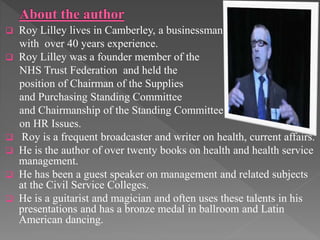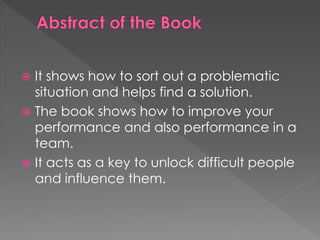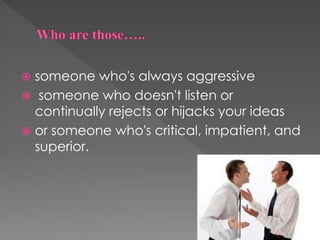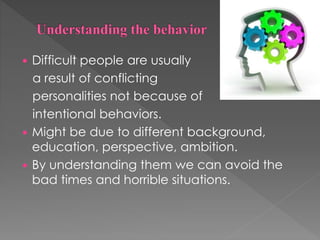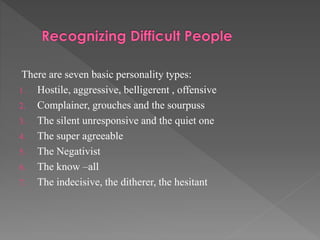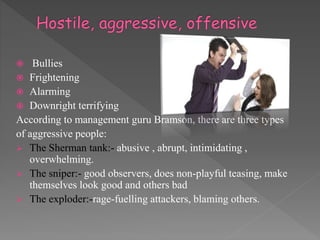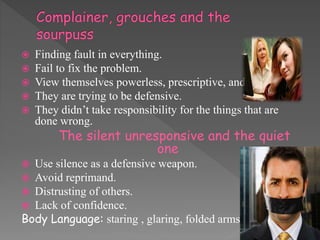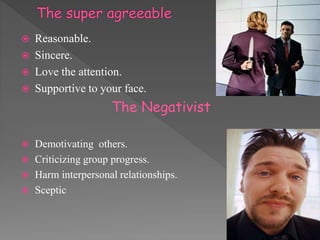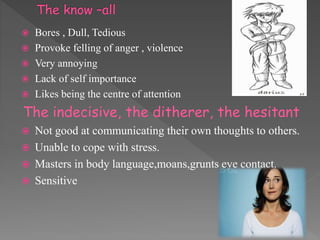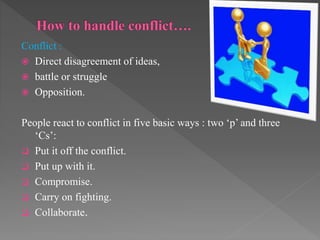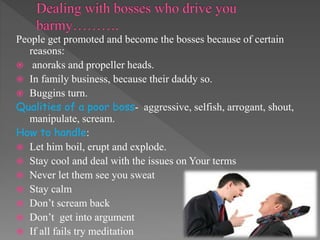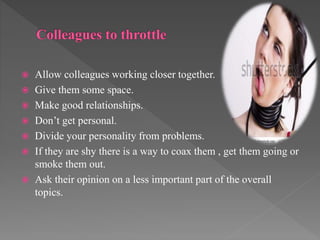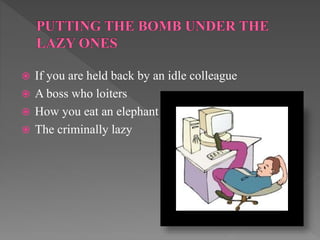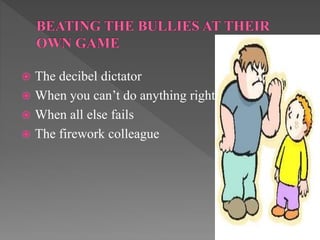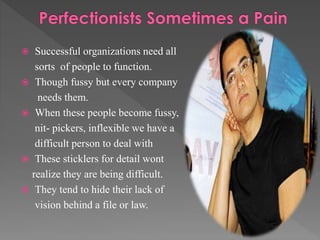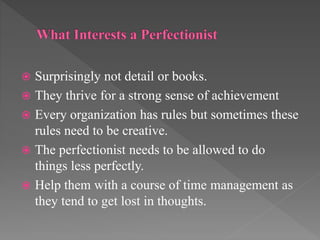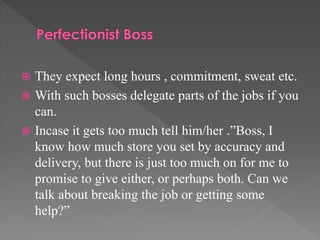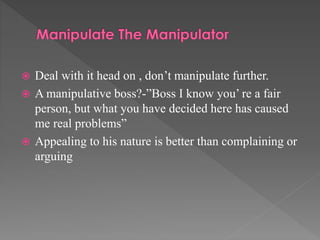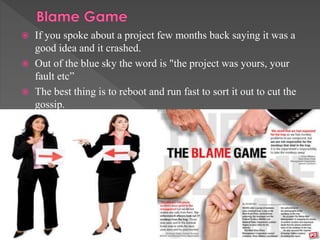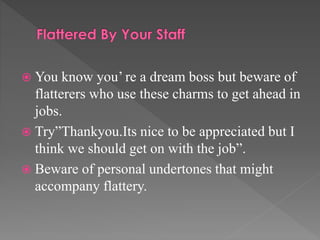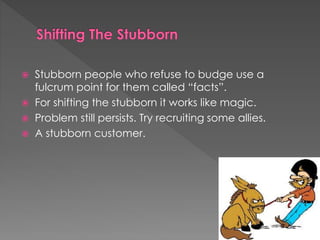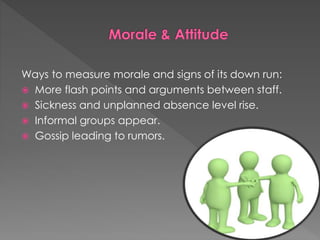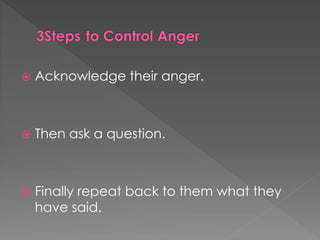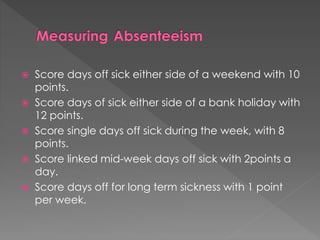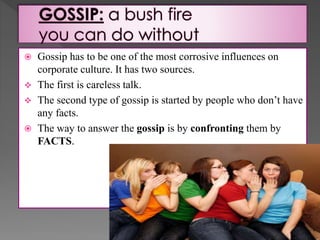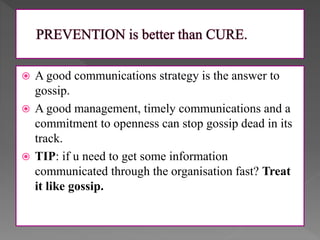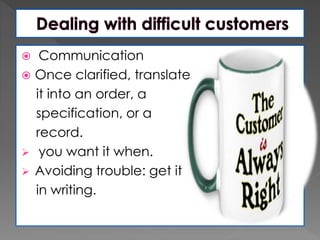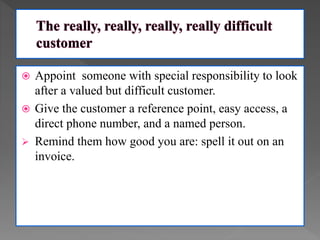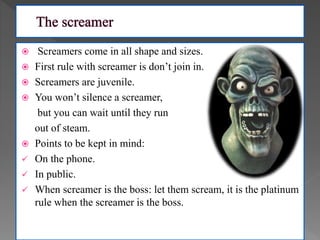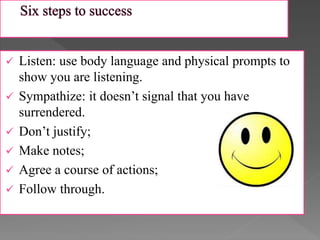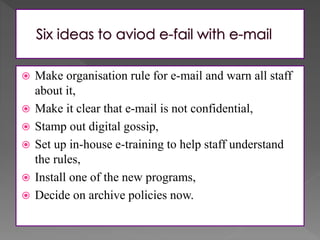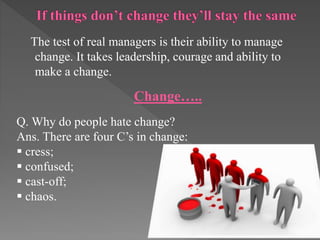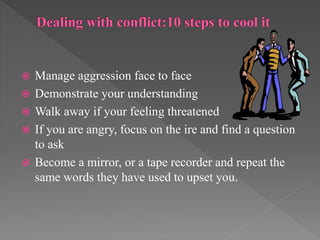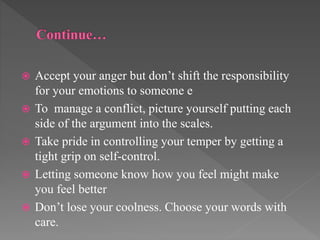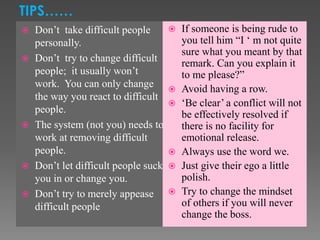Presentation2
- 1. BY: Roy Lilley Dealing with difficult people.
- 2. ´ü▒ Roy Lilley lives in Camberley, a businessman with over 40 years experience. ´ü▒ Roy Lilley was a founder member of the NHS Trust Federation and held the position of Chairman of the Supplies and Purchasing Standing Committee and Chairmanship of the Standing Committee on HR Issues. ´ü▒ Roy is a frequent broadcaster and writer on health, current affairs. ´ü▒ He is the author of over twenty books on health and health service management. ´ü▒ He has been a guest speaker on management and related subjects at the Civil Service Colleges. ´ü▒ He is a guitarist and magician and often uses these talents in his presentations and has a bronze medal in ballroom and Latin American dancing.
- 3. ´é× It shows how to sort out a problematic situation and helps find a solution. ´é× The book shows how to improve your performance and also performance in a team. ´é× It acts as a key to unlock difficult people and influence them.
- 4. ´é× someone who's always aggressive ´é× someone who doesn't listen or continually rejects or hijacks your ideas ´é× or someone who's critical, impatient, and superior.
- 5. ´éù Difficult people are usually a result of conflicting personalities not because of intentional behaviors. ´éù Might be due to different background, education, perspective, ambition. ´éù By understanding them we can avoid the bad times and horrible situations.
- 6. There are seven basic personality types: 1. Hostile, aggressive, belligerent , offensive 2. Complainer, grouches and the sourpuss 3. The silent unresponsive and the quiet one 4. The super agreeable 5. The Negativist 6. The know ÔÇôall 7. The indecisive, the ditherer, the hesitant
- 7. ´é× Bullies ´é× Frightening ´é× Alarming ´é× Downright terrifying According to management guru Bramson, there are three types of aggressive people: ´âÿ The Sherman tank:- abusive , abrupt, intimidating , overwhelming. ´âÿ The sniper:- good observers, does non-playful teasing, make themselves look good and others bad ´âÿ The exploder:-rage-fuelling attackers, blaming others.
- 8. ´é× Finding fault in everything. ´é× Fail to fix the problem. ´é× View themselves powerless, prescriptive, and perfect. ´é× They are trying to be defensive. ´é× They didnÔÇÖt take responsibility for the things that are done wrong. The silent unresponsive and the quiet one ´é× Use silence as a defensive weapon. ´é× Avoid reprimand. ´é× Distrusting of others. ´é× Lack of confidence. Body Language: staring , glaring, folded arms.
- 9. ´é× Reasonable. ´é× Sincere. ´é× Love the attention. ´é× Supportive to your face. The Negativist ´é× Demotivating others. ´é× Criticizing group progress. ´é× Harm interpersonal relationships. ´é× Sceptic
- 10. ´é× Bores , Dull, Tedious ´é× Provoke felling of anger , violence ´é× Very annoying ´é× Lack of self importance ´é× Likes being the centre of attention The indecisive, the ditherer, the hesitant ´é× Not good at communicating their own thoughts to others. ´é× Unable to cope with stress. ´é× Masters in body language,moans,grunts eye contact. ´é× Sensitive
- 11. ´é× Watch and take a notice ´é× Weather the person is dealing with any stress. ´é× to ask yourself that if you have been suffering from any exceptional stress. ´é× adult-to-adult conversation.
- 12. Conflict : ´é× Direct disagreement of ideas, ´é× battle or struggle ´é× Opposition. People react to conflict in five basic ways : two ÔÇÿpÔÇÖ and three ÔÇÿCsÔÇÖ: ´ü▒ Put it off the conflict. ´ü▒ Put up with it. ´ü▒ Compromise. ´ü▒ Carry on fighting. ´ü▒ Collaborate.
- 13. People get promoted and become the bosses because of certain reasons: ´é× anoraks and propeller heads. ´é× In family business, because their daddy so. ´é× Buggins turn. Qualities of a poor boss- aggressive, selfish, arrogant, shout, manipulate, scream. How to handle: ´é× Let him boil, erupt and explode. ´é× Stay cool and deal with the issues on Your terms ´é× Never let them see you sweat ´é× Stay calm ´é× DonÔÇÖt scream back ´é× DonÔÇÖt get into argument ´é× If all fails try meditation
- 14. ´é× Allow colleagues working closer together. ´é× Give them some space. ´é× Make good relationships. ´é× DonÔÇÖt get personal. ´é× Divide your personality from problems. ´é× If they are shy there is a way to coax them , get them going or smoke them out. ´é× Ask their opinion on a less important part of the overall topics.
- 15. ´é× If the difficulty is an egomaniac boss ´é× The egomaniac colleague ´é× Knocking the know-all
- 16. ´é× If an aggressive manager is trying to dump on your ideas ´é× If youÔÇÖre landed with a project that will never fly ´é× If youÔÇÖre being stabbed in the back
- 17. ´é× If you are held back by an idle colleague ´é× A boss who loiters ´é× How you eat an elephant ´é× The criminally lazy
- 18. ´é× The decibel dictator ´é× When you canÔÇÖt do anything right ´é× When all else fails ´é× The firework colleague
- 19. ´é× Successful organizations need all sorts of people to function. ´é× Though fussy but every company needs them. ´é× When these people become fussy, nit- pickers, inflexible we have a difficult person to deal with ´é× These sticklers for detail wont realize they are being difficult. ´é× They tend to hide their lack of vision behind a file or law.
- 20. ´é× Surprisingly not detail or books. ´é× They thrive for a strong sense of achievement ´é× Every organization has rules but sometimes these rules need to be creative. ´é× The perfectionist needs to be allowed to do things less perfectly. ´é× Help them with a course of time management as they tend to get lost in thoughts.
- 21. ´é× They expect long hours , commitment, sweat etc. ´é× With such bosses delegate parts of the jobs if you can. ´é× Incase it gets too much tell him/her .ÔÇØBoss, I know how much store you set by accuracy and delivery, but there is just too much on for me to promise to give either, or perhaps both. Can we talk about breaking the job or getting some help?ÔÇØ
- 22. ´é× Deal with it head on , donÔÇÖt manipulate further. ´é× A manipulative boss?-ÔÇØBoss I know youÔÇÖ re a fair person, but what you have decided here has caused me real problemsÔÇØ ´é× Appealing to his nature is better than complaining or arguing
- 23. ´é× If you spoke about a project few months back saying it was a good idea and it crashed. ´é× Out of the blue sky the word is "the project was yours, your fault etcÔÇØ ´é× The best thing is to reboot and run fast to sort it out to cut the gossip.
- 24. ´é× This could be a chance of a lifetime or you being manipulated. ´é× The call is yours! ´é× We enter with the assumption that the other party is honest. ´é× The key to doing a deal is that everyone benefits. ´é× Figure the deal from your side but more important from the other side of the table. ´é× Golden Rule 1.A promise if felt right for the project "do itÔÇØ if in doubt let go. ´é× Golden Rule2.Doing deals calls for records, minutes and agreements. They need not be formal.
- 25. ´é× You know youÔÇÖ re a dream boss but beware of flatterers who use these charms to get ahead in jobs. ´é× TryÔÇØThankyou.Its nice to be appreciated but I think we should get on with the jobÔÇØ. ´é× Beware of personal undertones that might accompany flattery.
- 26. ´é× Stubborn people who refuse to budge use a fulcrum point for them called ÔÇ£factsÔÇØ. ´é× For shifting the stubborn it works like magic. ´é× Problem still persists. Try recruiting some allies. ´é× A stubborn customer.
- 27. Ways to measure morale and signs of its down run: ´é× More flash points and arguments between staff. ´é× Sickness and unplanned absence level rise. ´é× Informal groups appear. ´é× Gossip leading to rumors.
- 28. ´é× Acknowledge their anger. ´é× Then ask a question. ´é× Finally repeat back to them what they have said.
- 29. ´é× Score days off sick either side of a weekend with 10 points. ´é× Score days of sick either side of a bank holiday with 12 points. ´é× Score single days off sick during the week, with 8 points. ´é× Score linked mid-week days off sick with 2points a day. ´é× Score days off for long term sickness with 1 point per week.
- 30. ´é× Gossip has to be one of the most corrosive influences on corporate culture. It has two sources. ´ü The first is careless talk. ´ü The second type of gossip is started by people who donÔÇÖt have any facts. ´é× The way to answer the gossip is by confronting them by FACTS.
- 31. ´é× A good communications strategy is the answer to gossip. ´é× A good management, timely communications and a commitment to openness can stop gossip dead in its track. ´é× TIP: if u need to get some information communicated through the organisation fast? Treat it like gossip.
- 32. ´é× Communication ´é× Once clarified, translate it into an order, a specification, or a record. ´âÿ you want it when. ´âÿ Avoiding trouble: get it in writing.
- 33. ´é× Appoint someone with special responsibility to look after a valued but difficult customer. ´é× Give the customer a reference point, easy access, a direct phone number, and a named person. ´âÿ Remind them how good you are: spell it out on an invoice.
- 34. ´é× Screamers come in all shape and sizes. ´é× First rule with screamer is donÔÇÖt join in. ´é× Screamers are juvenile. ´é× You wonÔÇÖt silence a screamer, but you can wait until they run out of steam. ´é× Points to be kept in mind: ´â╝ On the phone. ´â╝ In public. ´â╝ When screamer is the boss: let them scream, it is the platinum rule when the screamer is the boss.
- 35. ´â╝ Listen: use body language and physical prompts to show you are listening. ´â╝ Sympathize: it doesnÔÇÖt signal that you have surrendered. ´â╝ DonÔÇÖt justify; ´â╝ Make notes; ´â╝ Agree a course of actions; ´â╝ Follow through.
- 36. ´é× Make organisation rule for e-mail and warn all staff about it, ´é× Make it clear that e-mail is not confidential, ´é× Stamp out digital gossip, ´é× Set up in-house e-training to help staff understand the rules, ´é× Install one of the new programs, ´é× Decide on archive policies now.
- 37. The test of real managers is their ability to manage change. It takes leadership, courage and ability to make a change. ChangeÔǪ.. Q. Why do people hate change? Ans. There are four CÔÇÖs in change: ´éº cress; ´éº confused; ´éº cast-off; ´éº chaos.
- 38. ´é× Manage aggression face to face ´é× Demonstrate your understanding ´é× Walk away if your feeling threatened ´é× If you are angry, focus on the ire and find a question to ask ´é× Become a mirror, or a tape recorder and repeat the same words they have used to upset you.
- 39. ´é× Accept your anger but donÔÇÖt shift the responsibility for your emotions to someone e ´é× To manage a conflict, picture yourself putting each side of the argument into the scales. ´é× Take pride in controlling your temper by getting a tight grip on self-control. ´é× Letting someone know how you feel might make you feel better ´é× DonÔÇÖt lose your coolness. Choose your words with care.
- 40. If talking of difficult people depresses you think of the people who make you happy, the folk who delight you the ones who you look forward to seeing and who light up your life.
- 41. ´é× DonÔÇÖt take difficult people personally. ´é× DonÔÇÖt try to change difficult people; it usually wonÔÇÖt work. You can only change the way you react to difficult people. ´é× The system (not you) needs to work at removing difficult people. ´é× DonÔÇÖt let difficult people suck you in or change you. ´é× DonÔÇÖt try to merely appease difficult people ´é× If someone is being rude to you tell him ÔÇ£I ÔÇÿ m not quite sure what you meant by that remark. Can you explain it to me please?ÔÇØ ´é× Avoid having a row. ´é× ÔÇÿBe clearÔÇÖ a conflict will not be effectively resolved if there is no facility for emotional release. ´é× Always use the word we. ´é× Just give their ego a little polish. ´é× Try to change the mindset of others if you will never change the boss. TIPSÔǪÔǪ


